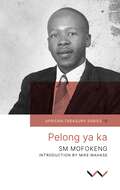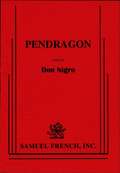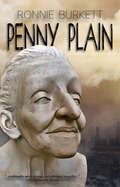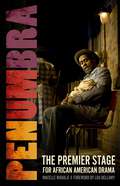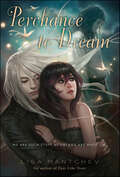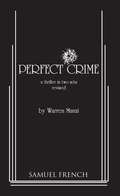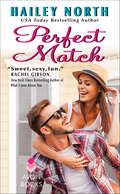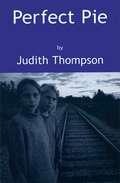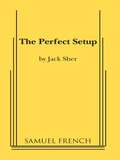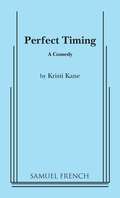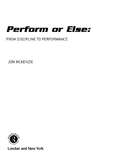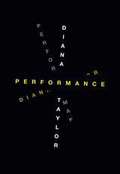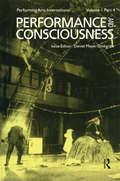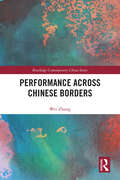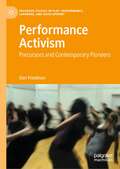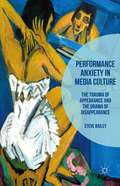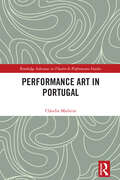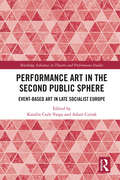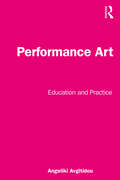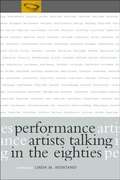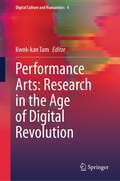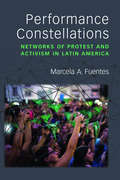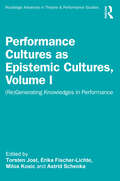- Table View
- List View
Pelong ya Ka (African Treasury Series #1)
by Sophonia Machabe MofokengPelong ya Ka, a collection of essays and sketches in Sotho was first published in 1962 in the Bantu Treasury Series imprint of Witwatersrand University Press. S. Machabe Mofokeng is regarded as one of the greatest essayist and dramatist in Southern Sotho. His first book, Senkatana (a play) was published in 1952.Pelong ya Ka comprises 20 essays which range from meditative, descriptive, and narrative to polemic style, with the tone of voice characterised by melancholy, humour, and satire. The essays span over a wide range of themes, as suggested by their titles, e.g. Pelo (The heart), Bodutu (‘Solitude’), Death (‘Lefu’), Nako (‘Time’), Pampiri (‘Paper’), Ho kganna mmotokara (‘Driving an automobile’), Sepetlele (‘Hospital’), Lenyalo (‘Matromony’), and Boqheku (‘Old age’). Nhlanhla Maake says of this collection “Mofokeng’s essays fuse simplicity with dept.” Pelong ya Ka is part of the African Treasury Series published by Wits University Press.
Pendragon
by Don NigroComedic Drama / 6m, 5f, with doubling / Unit Set / In this robust and compelling tale commissioned and produced by the Idaho Shakespeare Festival, John Rhys Pendragon is at Guernica during the Fascist bombing in 1937. His memories take him back to 1910 and conjure up Mark Twain, Teddy Roosevelt, James J. Jeffries and Ernest Hemingway as the play pieces together his remarkable life, recalls his three lost loves and vividly portrays colorful characters he has interviewed. This unique American love story is part of the author's cycle the Pendragon Plays.
Penny Plain
by Ronnie BurkettHumanity is facing extinction, and Penny Plain, elderly and blind, can only sit and wait for the end. After a heartbreaking farewell from her dog, Geoffrey, who leaves to live as a man, Penny faces the inevitable by herself. But she isn't alone for long as a cast of characters, including a serial killer, a cross-dressing banker, and talking dogs barge into her boarding house in pursuit of last chances and an escape from the hostile world outside. With this steady invasion, Penny bears witness to the funny and chilling consequences as mother earth cleans house and reclaims her ground.
Penumbra: The Premier Stage for African American Drama
by Macelle MahalaPenumbra Theatre Company was founded in 1976 by Lou Bellamy as a venue for African American voices within the Twin Cities theatre scene and has stood for more than thirty-five years at the intersection of art, culture, politics, and local community engagement. It has helped launch the careers of many internationally respected theatre artists and has been repeatedly recognized for its artistic excellence as the nation&’s foremost African American theatre.Penumbra is the first-ever history of this barrier-breaking institution. Based on extensive interviews with actors, directors, playwrights, producers, funders, and critics, Macelle Mahala&’s book offers a multifaceted view of the theatre and its evolution. Penumbra follows the company&’s emergence from the influential Black Arts and settlement house movements; the pivotal role Penumbra played in the development of August Wilson&’s career and, in turn, how Wilson became an avid supporter and advocate throughout his life; the annual production of Black Nativity as a community-building performance; and the difficult economics of African American theatre production and how Penumbra has faced these challenges for nearly four decades. Penumbra is a testament to how a theatre can respond to and thrive within changing political and cultural realities while contributing on a national scale to the African American presence on the American stage. It is a celebration of theatre as a means of social and cultural involvement—both local and national—and ultimately, of Penumbra&’s continuing legacy of theatre that is vibrant, diverse, and vital.
Peony Pavilion: Mudan Ting
by Cyril Birch Tang XianzuThe Peony Pavilion is one of literature's most memorable love stories and a masterpiece of Ming drama.
Perchance to Dream (Theatre Illuminata)
by Lisa MantchevFrom the critically acclaimed author of Eyes Like StarsWe are such stuff as dreams are made on.Act Two, Scene OneGrowing up in the enchanted Thèâtre Illuminata, Beatrice Shakespeare Smith learned everything about every play ever written. She knew the Players and their parts, but she didn't know that she, too, had magic. Now, she is the Mistress of Revels, the Teller of Tales, and determined to follow her stars. She is ready for the outside world. Enter BERTIE AND COMPANYBut the outside world soon proves more topsy-turvy than any stage production. Bertie can make things happen by writing them, but outside the protective walls of the Thèâtre, nothing goes as planned. And her magic cannot help her make a decision between—Nate: Her suave and swashbuckling pirate, now in mortal peril. Ariel: A brooding, yet seductive, air spirit whose true motives remain unclear.When Nate is kidnapped and taken prisoner by the Sea Goddess, only Bertie can free him. She and her fairy sidekicks embark on a journey aboard the Thèâtre's caravan, using Bertie's word magic to guide them. Along the way, they collect a sneak-thief, who has in his possession something most valuable, and meet The Mysterious Stranger, Bertie's father—and the creator of the scrimshaw medallion. Bertie's dreams are haunted by Nate, whose love for Bertie is keeping him alive, but in the daytime, it's Ariel who is tantalizingly close, and the one she is falling for. Who does Bertie love the most? And will her magic be powerful enough to save her once she enters the Sea Goddess's lair? Once again, LISA MANTCHEV has spun a tale like no other—full of romance, magic, adventure, and fairies, too—that readers won't want to put down, even after the curtain has closed.
Perfect Crime: A Thriller in Two Acts
by Warren ManziThis cat and mouse thriller is one of Off Broadway's longest running hits. Margaret Thorne Brent, psychiatrist and author, has returned to America with her husband, also a psychiatrist, and settled in an affluent Connecticut community where at least one bizarre murder has taken place. Inspector James Ascher, the local cop, becomes obsessed with Margaret, her patients and their sitting room, where he believes the solution to the murder lies.
Perfect Match
by Hailey NorthWhile Not Looking For Mr. Right...Although she vows that she's locked her heart and thrown away the key, ravishing red-headed Lauren Stevens suddenly has several men vying to prove her wrong—and to win the right to set free her passionate self. Button-down banker Oliver Gotho seems like a good candidate, but it's Oliver's sexy brother Alistair who has invited the beautiful, penniless free spirit to share his living space—temporarily, of course. She thinks she should encourage the successful businessman brother, yet is it Alistair with the oh-so-sensual magic touch who holds the key to her happiness?Has She Found Her Perfect Match?Sexy, wise, and charismatic, Alistair has offered Lauren a place to stay out of the goodness of his heart—and certainly not because of her gorgeous eyes, luscious lips and enchanting body. Lauren may entrance him, but it's time for him to find a sensible woman to take to wife. And Lauren, with her penchant for peccadilloes, spells nothing but trouble. But spring is in the balmy New Orleans air, and so is love, as both Lauren and Alistair discover that the heart-pounding perfect match isn't always the one knocking at the door...
Perfect Pie
by Judith ThompsonIn the course of an afternoon's reunion between two long-estranged women, a buried memory, and two teenagers' wild secret, slams into the present. When Patsy invites her old friend Francesca, now a glamourous actress, to her home in Marmora after a thirty-year absence the two women reunite with a certain amount of unease. As the day progresses, we learn how their friendship blossomed in their adolescence and how, on one fateful day, it all ended.
Perfect Set-Up
by Jack SherComedy / 1 m, 2 f / Interior / A public relations man has a lovely wife in Westchester and a girl friend in New York City. When he then discovers his wife is seeing another man, she says she's only practicing his theory of marital freedom. And so our man bounces back and forth between the two ladies. Finally, he returns, contrite, to his wife and learns she's never loved anyone but him. / "Funny,engaging, tender, even poignant." N.Y. World Telegram and Sun.
Perfect Timing
by Kristi KaneComedy / 4m, 4f / "Effervescent" would be the best adjective to describe this contemporary British drawing room comedy, written by a contemporary non British author. Set in the mad cap household of glamorous and neurotic art critic Cornelia Thorndike, her German maid and her splendidly sane secretary, the comedy bubbles along with a delicious assortment of intruders, passers by, droppers in and long and short term lovers, all of whom invariably bump into each other in the wrong place at the wrong time.
Perform or Else: From Discipline to Performance
by Jon McKenzie'Performance' has become one of the key terms for the new century. But what do we mean by 'performance'? In today's world it can refer to experimental art; productivity in the workplace; and the functionality of technological systems. Do these disparate fields bear any relation to each other?In Perform or Else Jon McKenzie asserts that there is a relationship cultural, organisational, and technological performance. In this theoretical tour de force McKenzie demonstrates that all three paradigms operate together to create powerful and contradictory pressures to 'perform...or else'. This is an urgent and important intervention in contemporary critical thinking. It will profoundly shape our understanding of twenty-first century structures of power and knowledge.
Performance
by Diana Taylor"Performance" has multiple and often overlapping meanings that signify a wide variety of social behaviors. In this invitation to reflect on the power of performance, Diana Taylor explores many of its uses and iterations: artistic, economic, sexual, political, and technological performance; the performance of everyday life; and the gendered, sexed, and racialized performance of bodies. This book performs its argument. Images and texts interact to show how performance is at once a creative act, a means to comprehend power, a method of transmitting memory and identity, and a way of understanding the world.
Performance & Consciousness
by Daniel Meyer-DinkgräfeThis is volume 1, part 4 of the Performing Arts International forum. This collection of essays covers a breadth of topics on the theme of consciousness; addressing the trend of studies trying to put human experience into more concrete, cogent, less poetic and metaphorical terms. Major issues raised by the essays are summarised, and a hypothesis serving as a stimulus for further research and debate is suggested by the volume's conclusion.
Performance Across Chinese Borders (Routledge Contemporary China Series)
by Wei ZhangThis book examines the dynamic intermingling of Asian performance of theatre and dance across the borders of the ancient Silk Road, which connected China with cultures and countries throughout Asia, and beyond.Revealing the dynamic interweaving of cultures between China and its neighbors from the time of the ancient Silk Road to modern times, the book demonstrates how such interweaving has been reflected and embodied in the performance forms and genres of East, South, and Southeast Asia. Through individual explorations of the artistic expressions in these Asian countries, the book reveals the transformative impact of the dissemination and interfusion of religion, beliefs, and cultural practices on the development of performance arts/genres in Asia. The book effectively displays how this robust interfusion across borders left a profound and indelible imprint on the various forms of artistic expression.Representing a succinct analysis of the thousands of years of intercultural cross-fertilization and diffusion across borders of the performing arts in Asia, this book makes an important contribution to transcultural studies in theatre, dance, performance, literature.
Performance Activism: Precursors and Contemporary Pioneers (Palgrave Studies In Play, Performance, Learning, and Development)
by Dan FriedmanThis is the first book length study of performance activism. While Performance Studies recognizes the universality of human performance in daily life, what is specifically under investigation here is performance as an activity intentionally entered into as a means of engaging social issues and conflicts, that is, as an ensemble activity by which we re-construct/transform social reality. Performance Activism: Precursors and Contemporary Pioneers provides a global overview of the growing interface of performance with education, therapy, conflict resolution, civic engagement, community development and social justice activism. It combines an historical study of the processes by which, over the course of the 20th Century, performance has been loosened from the institutional constraints of the theatre with a mosaic-like overview of the diverse work/play of contemporary performance activists around the world. Performance Activism will be of interest to theatre and cultural historians, performance practitioners and researchers, psychologists and sociologists, educators and youth workers, community organizers and political activists.
Performance Anxiety in Media Culture: The Trauma of Appearance and the Drama of Disappearance
by Steve BaileyPerformance Anxiety in Media Culture.
Performance Art in Portugal (Routledge Advances in Theatre & Performance Studies)
by Cláudia MadeiraThis book explores histories which have only recently been rediscovered by artists and researchers. This study explores the history of Portuguese performance art, in its various "speculative" and "performative" forms. The author approaches this relationship with the re-emergence and centrality of these (semi-)peripheral histories at an international level, whilst identifying some of their unique traits: their cycles of emergence and retraction in Portuguese history; their multiple and complex ontologies; the intertwined relations between the art of performance and the social performance of the Portuguese (regarding topics as sensitive and fracturing as those of the long dictatorship, the colonial war and the revolutionary process, or even the integration of Portugal in the European Community and, more recently, the various 21st century social, political and economic crises). This reading in turn covers the development of the relationship between performance and hybridism, namely, analyzing the recent dimension of meta-hybridism, in the processes of artistic homage that contemporary Portuguese creators have been establishing through access to the histories and archives of this historical genre. This book will be of great interest to students and scholars in theatre and performance studies, performance art and arts in general.
Performance Art in the Second Public Sphere: Event-based Art in Late Socialist Europe (Routledge Advances in Theatre & Performance Studies)
by Katalin Cseh-Varga Adam CzirakPerformance Art in the Second Public Sphere is the first interdisciplinary analysis of performance art in East, Central and Southeast Europe under socialist rule. By investigating the specifics of event-based art forms in these regions, each chapter explores the particular, critical roles that this work assumed under censorial circumstances. The artistic networks of Yugoslavia, Hungary, Latvia, Lithuania, Poland, Romania, East Germany and Czechoslovakia are discussed with a particular focus on the discourses that shaped artistic practice at the time, drawing on the methods of Performance Studies and Media Studies as well as more familiar reference points from art history and area studies.
Performance Art: Education and Practice
by Angeliki AvgitidouPerformance Art: Education and Practice is an introduction to performance art through activities and practice prompts that are framed by seminal moments in the history of the medium as well as the current theoretical discussions surrounding performance. The book begins by introducing the terminology related to performance art and its early history. The basic elements of performance, including the body, objects, space, the public, and the public sphere are approached through thematic and conceptual correlations such as objects as autobiography, body as an expression of gendered identity, performance and the everyday, the augmented body, the archive of performance, and public space as space for intervention. Case studies analysed in each chapter are accompanied by reflective questions and discussion topics. The book proposes a wide range of exercises and comprehensive practice prompts that aim to enhance performance skills, promote experimentation, and encourage an experiential understanding of the theory, history, and concepts relating to performance art. Performance Art: Education and Practice is addressed to students of Fine Arts and Performance Studies from beginner to intermediate level, performance and visual artists who are interested in expanding their knowledge base and creative range, and artist-teachers who are interested in developing their own curriculum and workshop content.
Performance Artists Talking in the Eighties
by Linda M. MontanoThe interaction of the performance artist Linda Montano with other performance artists to consider how early events associated with sex, food, money/fame, or death/ritual resurfaced in their later work has resulted in a talking performance that documents the production of art in a misunderstood community. Her discussions with more than 100 artists, focused on the relationship between art and life, history and memory, the individual and society, and the potential for individual and social change.
Performance Arts: Research in the Age of Digital Revolution (Digital Culture and Humanities #4)
by Kwok-Kan TamThis volume reshapes a contemporary understanding of research in theatre and performance arts. Bringing together distinguished scholars from all over the world, the book serves as an arena for international scholars to introduce innovative research methodologies and disseminate their research findings regarding VLT, data archiving, and digital history and discusses the impacts of digital culture in art production, stage performance, film, and literature. The Ibsen focus in the book is illustrative of the power of digital database research that is generating new relations in spatial-historical dimensions that have otherwise gone unnoticed. It demonstrates how a new methodology can bring practical benefits to handling big data with the support of digital technologies. In line with the post-pandemic landscape, this book engages a reflection on how the digital revolution has brought about changes and challenges, and constraints and breakthroughs within the field of theatre and performance arts. It is of appeal to theatre artists and practitioners, scholars, critics, librarians, digital archive engineers, and postgraduate students interested in theatre, performance studies, digital media, information technology, library science, communication, education, sociology, as well as political science. “The book investigates the latest methodological development in digital cultures and performance arts, which significantly contributes to the ever-changing and increasingly advanced technological culture in this field.” - Jessica Tsui-yan Li, York University, Canada"In line with the post-pandemic landscape, this book engages the reader in reflecting on how the digital revolution has brought about chances and challenges, constraints and breakthroughs to the field of theatre and performance arts. An original, eye-opening and inspiring volume at multiple levels, this book brings together distinguished scholars from all over the world." - Dr Anna Tso, The Hang Seng University of Hong Kong
Performance Constellations: Networks of Protest and Activism in Latin America (Theater: Theory/Text/Performance)
by Marcela A FuentesPerformance Constellations maps transnational protest movements and the dynamics of networked expressive behavior in the streets and online, as people struggle to be heard and effect long-term social justice. Its case studies explore collective political action in Latin America, including the Zapatistas in the mid-’90s, protests during the 2001 Argentine economic crisis, the 2011 Chilean student movement, the 2014–2015 mobilizations for the disappeared Ayotzinapa students, and the 2018 transnational reproductive rights movement. The book analyzes uses of space, time, media communication, and corporeality in protests such as virtual sit-ins, flash mobs, scarfazos, and hashtag campaigns, arguing that these protests not only challenge hegemonic power but are also socially transformative. While other studies have focused either on digital activism or on street protests, Performance Constellations shows that they are in fact integrally entwined. Zooming in on protest movements and art-activism in Mexico, Argentina, and Chile, and putting contemporary insurgent actions in dialogue with their historical precedents, the book demonstrates how, even in moments of extreme duress, social actors in Latin America have taken up public and virtual space to intervene politically and to contest dominant powers.
Performance Cultures as Epistemic Cultures, Volume I: (Re)Generating Knowledges in Performance (Routledge Advances in Theatre & Performance Studies)
by Torsten Jost, Erika Fischer-Lichte, Milos Kosic and Astrid SchenkaThis volume investigates performances as situated "machineries of knowing" (Karin Knorr Cetina), exploring them as relational processes for, in and with which performers as well as spectators actively (re)generate diverse practices of knowing, knowledges and epistemologies. Performance cultures are distinct but interconnected environments of knowledge practice. Their characteristic features depend not least on historical as well as contemporary practices and processes of interweaving performance cultures. The book presents case studies from diverse locations around the globe, including Argentina, Canada, China, Greece, India, Poland, Singapore, and the United States. Authored by leading scholars in theater, performance and dance studies, its chapters probe not only what kinds of knowledges are (re)generated in performances, for example cultural, social, aesthetic and/or spiritual knowledges; the contributions investigate also how performers and spectators practice knowing (and not-knowing) in performances, paying particular attention to practices and processes of interweaving performance cultures and the ways in which they contribute to shaping performances as dynamic "machineries of knowing" today. Ideal for researchers, students and practitioners of theater, performance and dance, (Re)Generating Knowledges in Performance explores vital knowledge-serving functions of performance, investigating and emphasizing in particular the impact and potential of practices and processes of interweaving of performance cultures that enable performers and spectators to (re)generate crucial knowledges in increasingly diverse ways.

